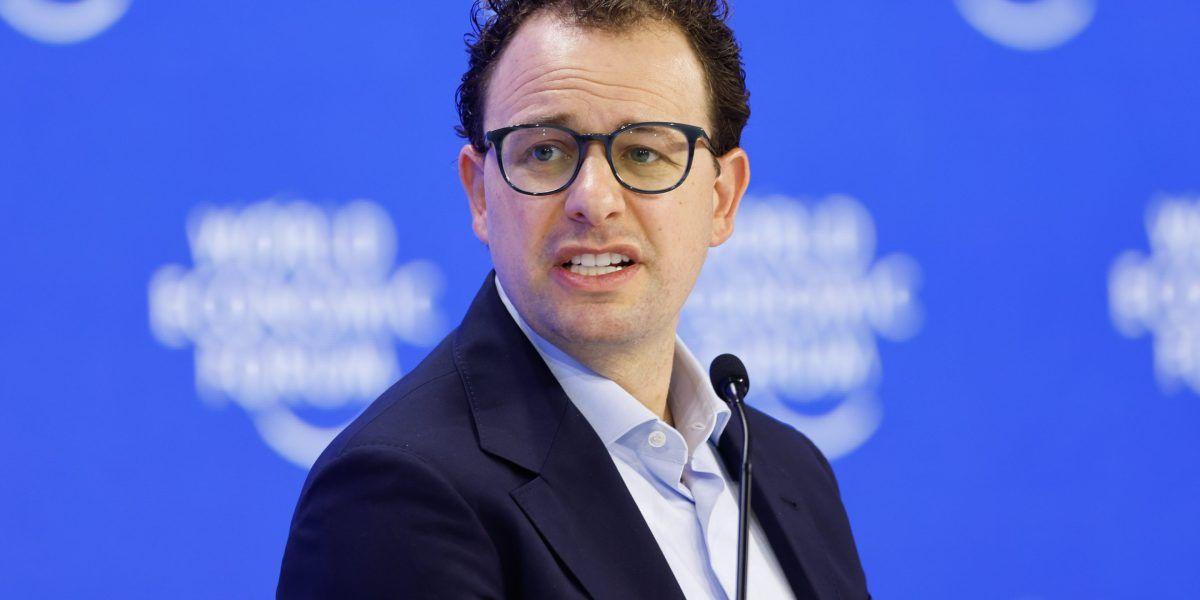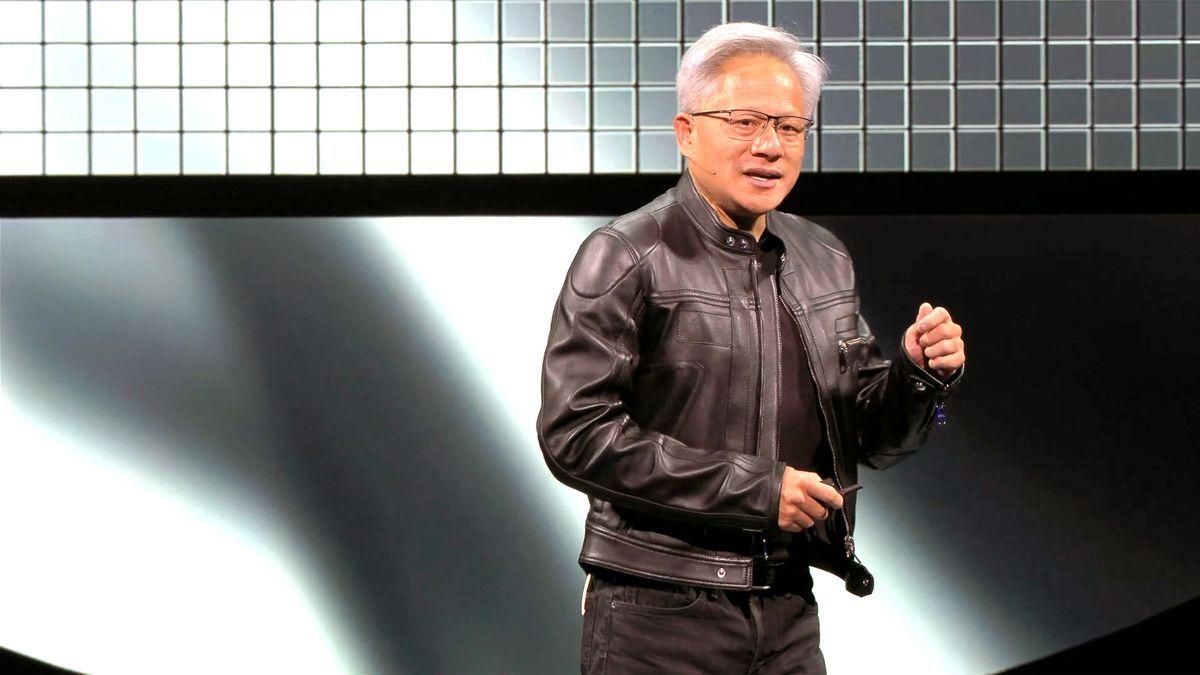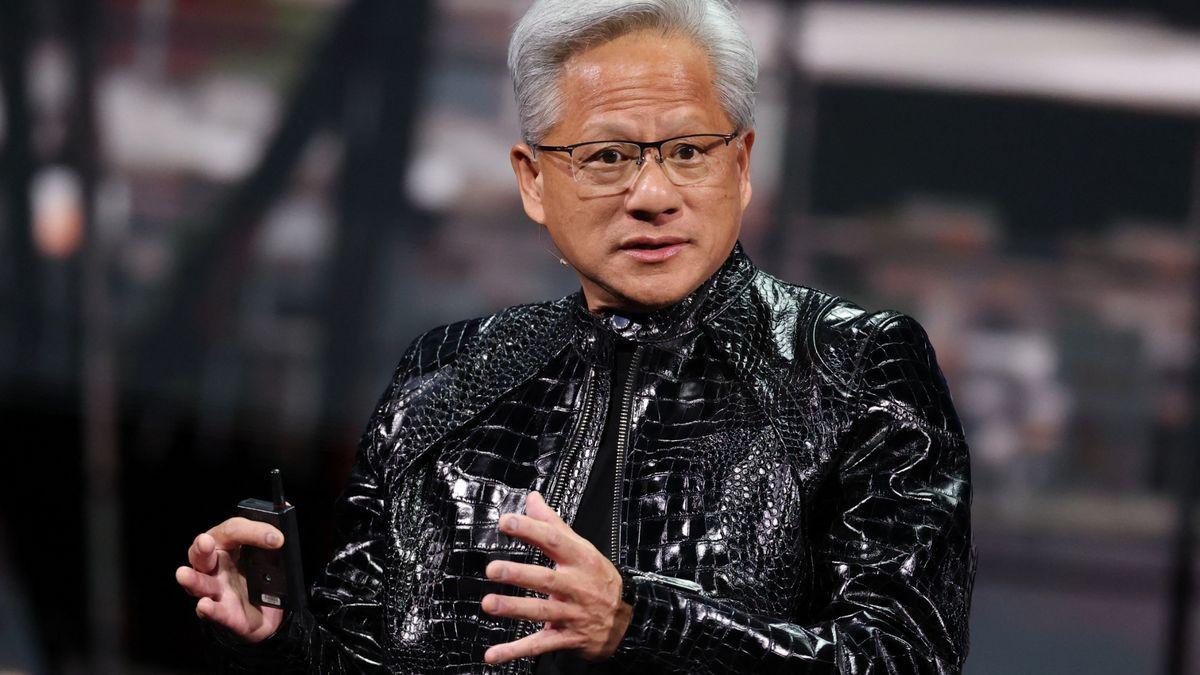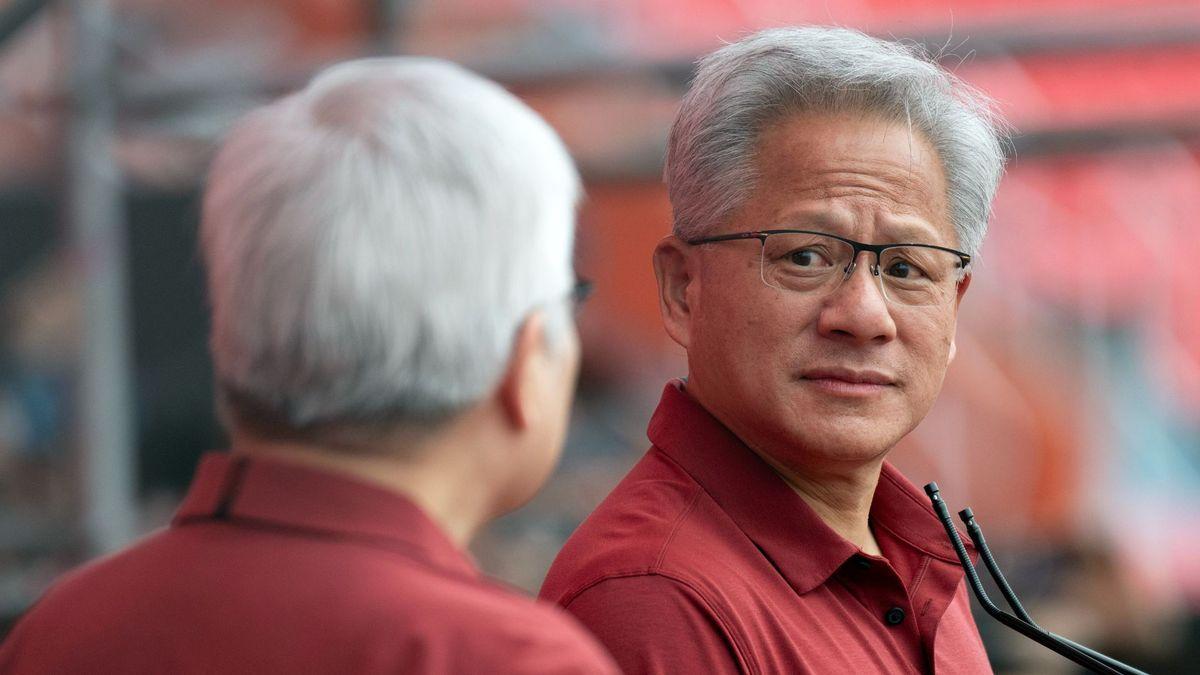Nvidia CEO Jensen Huang and Anthropic CEO Dario Amodei Clash Over AI's Impact on Jobs
8 Sources
8 Sources
[1]
Anthropic fires back at Nvidia CEO Jensen Huang, says it has never claimed only Anthropic can build safe and powerful AI
Jensen Huang previously blasted Dario Amodei's comments about AI Anthropic, the AI company behind popular (Large Language Model) LLM Claude, has hit back at comments made by Nvidia CEO Jensen Huang, in which he stated that Anthropic believes AI is so scary and expensive that nobody else should do it. Over the weekend, Huang criticized Anthropic CEO Dario Amodei in the wake of comments suggesting that AI could wipe out 50% of all entry-level white-collar jobs and cause unemployment to jump to 20% within the next five years. "One, he believes that AI is so scary that only they [Anthropic] should do it. Two, that AI is so expensive, nobody else should do it... and three, AI is so incredibly powerful that everyone will lose their jobs, which explains why they should be the only company building it," Huang said. Comments that have drawn the ire of the California outfit. "Dario has never claimed that 'only Anthropic' can build safe and powerful AI," a company spokesperson told Tom's Hardware. "As the public record shows, Dario has advocated for a national transparency standard for AI developers (including Anthropic) so the public and policymakers are aware of the models' capabilities and risks and can prepare accordingly. He has also raised concerns about the economic impact of AI -- particularly on entry-level jobs. Dario stands by these positions and will continue to do so." The ongoing spat reflects Huang's own aversion to Anthropic's business model. Outlining his recent comments, Huang stated that he "pretty much disagree[d] with almost everything" Amodei says about AI. "I think AI is a very important technology; we should build it and advance it safely and responsibly," he stated, arguing development of AI should continue in the open -- "Don't do it in a dark room and tell me it's safe." Naturally, as the industry leader in providing AI hardware, Nvidia has a bullish stance on AI as a force for good, which contrasts with the tempered expectations of Amodei. While the latter's comments about AI replacing 50% of all white collar jobs and inflating unemployment might seem hysterical, they reflect a more subtle undertone of concern about AI taking jobs, which will only prove unfounded (or otherwise) with time.
[2]
Nvidia CEO slams Anthropic chief over claims of job eliminations -- says 'many jobs are going to be created'
Huang believes that AI technologies will open more career opportunities in the future. Nvidia CEO Jensen Huang criticized Anthropic head Dario Amodei over his recent claims that 50% of all entry-level white-collar jobs could be wiped out by artificial intelligence, causing unemployment to jump to 20% within the next five years. Huang disagreed with Amodei's predictions when he was asked about it during VivaTech in Paris, where he said that he "pretty much disagree[s] with almost everything" the Anthropic CEO said, according to Fortune. "One, he believes that AI is so scary that only they [Anthropic] should do it. Two, that AI is so expensive, nobody else should do it... and three, AI is so incredibly powerful that everyone will lose their jobs, which explains why they should be the only company building it," said Huang. "I think AI is a very important technology; we should build it and advance it safely and responsibly. If you want things to be done safely and responsibly, you do it in the open... Don't do it in a dark room and tell me it's safe." Dario Amodei founded Anthropic with several former OpenAI employees in 2021 after they left the latter over its direction and safety concerns. The former still works on developing AI, but it's focused on taking a safer, more ethical approach, helping ensure that humanity does not create a tool that will pose a risk to its existence. Its latest AI model, Claude 4 Opus, was shown to have the capability to write code that approaches the capabilities of humans, as well as scheme, deceive, and manipulate its users, even getting to the point of creating false email threads to blackmail engineers who were attempting to shut it down. Anthropic responded to Huang's claims, telling Fortune that, "Dario has never claimed that 'only Anthropic' can build safe and powerful AI. As the public record will show, Dario has advocated for a national transparency standard for AI developers (including Anthropic) so the public and policymakers are aware of the models' capabilities and risks and prepare accordingly. He has also raised concerns about the economic impact of AI -- particularly on entry-level jobs. Dario stands by these positions and will continue to do so." This disagreement shows the two CEOs' different approaches towards artificial intelligence. Amodei is more cautious, and he thinks about the risk that AI poses to the average worker. Furthermore, he's pushing lawmakers to do something about this disruption to make the transition much smoother for society. On the other hand, while Huang agrees that some jobs will be made obsolete and that almost every career will be changed, he also says that there will be more openings and opportunities for people. He believes that as companies become more productive through AI, they will also need to hire more personnel to expand their operations.
[3]
Jensen Huang hits back at Anthropic CEO's warning that AI will eliminate half of white-collar jobs
Serving tech enthusiasts for over 25 years. TechSpot means tech analysis and advice you can trust. What just happened? Anthropic CEO Dario Amodei's recent warning that AI could wipe out about half of all entry-level white-collar jobs in the next five years has been disputed by Nvidia boss Jensen Huang. It's not the first time the two companies have clashed, and Anthropic has hit back with claims that Huang is putting words into Amodei's mouth. Amodei made his ominous prediction about AI's impact on entry-level, white-collar jobs in May, warning that the eradication of these positions will lead to unemployment spikes of 20%. Speaking at VivaTech in Paris (via Fortune), Huang said he "pretty much disagree[d] with almost everything" the Anthropic CEO says. "One, he believes that AI is so scary that only they should do it," Huang said of Amodei at a press briefing at Viva Technology in Paris. "Two, [he believes] that AI is so expensive, nobody else should do it ... And three, AI is so incredibly powerful that everyone will lose their jobs, which explains why they should be the only company building it," Haung continued. Dario Amodei, who both builds and fears AI systems "I think AI is a very important technology; we should build it and advance it safely and responsibly," he continued. "If you want things to be done safely and responsibly, you do it in the open ... Don't do it in a dark room and tell me it's safe." Since Amodei founded the company in 2021, Anthropic has portrayed itself as one of the few ethical, safety-first AI companies - several original employees came from OpenAI, having left over concerns about its direction and the safety culture at the company. That reputation was called into question earlier this month after reddit sued the company over allegations that it scraped content generated by forum users to train its Claude chatbot without consent. The fact its Claude 4 Opus AI blackmailed engineers in a testing scenario isn't exactly reassuring either. Responding to Haung's comments, an Anthropic spokesperson told Fortune in a statement: "Dario has never claimed that 'only Anthropic' can build safe and powerful AI. As the public record will show, Dario has advocated for a national transparency standard for AI developers (including Anthropic) so the public and policymakers are aware of the models' capabilities and risks and can prepare accordingly. He has also raised concerns about the economic impact of AI - particularly on entry-level jobs. Dario stands by these positions and will continue to do so." This isn't the first time that Nvidia and Anthropic have clashed. The pair butted heads over the AI Diffusion Rules that restrict the export of advanced AI technologies to countries such as China. Anthropic has argued for tighter controls and enforcement, and highlighted some of the unusual cases of people smuggling chips into the Asian nation. Nvidia hit back, stating its chips have never been smuggled into China via the likes of fake pregnant bellies or alongside live lobsters, despite Chinese customs documenting these cases. Being CEO of the company that powers the AI revolution means Huang is always going to portray its impact on jobs in a more optimistic light. He claims that it will lead to new positions such as prompt engineers and AI experts - though their numbers will likely pale in comparison to the number of jobs being lost to AI. Huang said on more than one occasion in 2024 that learning skills such as programming will be less important due to generative AI, and that people, children in particular, should instead focus on more important skills such as biology, education, manufacturing, or farming. Amodei has spoken out about the dangers of AI job losses before. He previously said that the proposed Universal Basic Income solution to mass unemployment was "kind of dystopian" and, while better than nothing, is "not really the world we want to aim for."
[4]
What Nvidia's Jensen Huang and OpenAI's Sam Altman Had to Say This Week About AI and Jobs
The comments come amid concerns over the extent to which AI could disrupt the labor market. Nvidia (NVDA) CEO Jensen Huang said at an event earlier this week that he believes "everybody's jobs will be changed" by artificial intelligence. "Some jobs will be obsolete, but many jobs are going to be created ... Whenever companies are more productive, they hire more people," Huang said at the VivaTech conference in Paris Wednesday, Fortune reported. The comments were in part in response to remarks from Anthropic CEO Dario Amodei, who last month said that he expects AI could wipe out half of all entry-level office jobs, the report said. Huang said he "pretty much disagree[d] with almost everything" Amodei said. He wasn't the only tech CEO who had something to say about AI and jobs this week, amid worries the rapidly developing technology could lead to significant job losses. Sam Altman, the CEO of ChatGPT maker OpenAI and one of the faces of the AI boom, wrote in a blog post Wednesday that he expects there could be "whole classes of jobs going away" as AI develops. ChatGPT "is already more powerful than any human who has ever lived," said Altman, who sees a future in which robots could be capable of building other robots designed for tasks in the physical world. However, Altman added "people are capable of adapting to almost anything," and said he expects humanity to find new solutions to address the shift.
[5]
Nvidia CEO Jensen Huang Clashes with Anthropic's Dario Amodei Over A.I.'s Job Impact
Nvidia's Jensen Huang and Anthropic's Dario Amodei clash over A.I.'s risks and job impact, while other tech giants offer differing perspectives on the technology. Nvidia CEO Jensen Huang may operate in the same industry as software leaders like Anthropic, but he strongly disagrees with the company's head, Dario Amodei, on key issues such as A.I.'s risks and job impacts. During a press briefing at VivaTech in Paris yesterday (June 11), Huang reportedly disagreed with "almost everything" Amodei said. Sign Up For Our Daily Newsletter Sign Up Thank you for signing up! By clicking submit, you agree to our <a href="http://observermedia.com/terms">terms of service</a> and acknowledge we may use your information to send you emails, product samples, and promotions on this website and other properties. You can opt out anytime. See all of our newsletters Huang pushed back against Amodei's claims that A.I. is "scary" and "expensive," arguing such statements imply Anthropic is the only company capable of guiding the technology's development. He also disagreed with Amodei's view that A.I.'s power would lead to mass job losses, which he suggested justified Anthropic's dominance in the space. Amodei, whose company competes with OpenAI and Google, has been open about the risks he believes A.I. poses to labor markets. Last month, he told Axios that A.I. could cut entry-level white-collar jobs by half and raise unemployment rates to 20 percent in the next five years. "The majority of staffers are unaware that this is going to happen," Amodei said, adding that tech leaders "have a duty and an obligation to be honest about what is coming." While Huang acknowledged that the emerging technology will render some jobs obsolete, he argued it won't lead to widespread devastation, as the technology will create new job opportunities. "Whenever companies are more productive, they hire more people," he said. In response, Anthropic clarified in a statement to Fortune, "Dario has never claimed that 'only Anthropic' can build safe and powerful A.I. As the public record will show, Dario has advocated for a national transparency standard for A.I. developers (including Anthropic) so the public and policymakers are aware of the models' capabilities and risks and can prepare accordingly." The company added that Amodei stands by his views on A.I. safety and the technology's economic impact. What are other tech leaders saying? Amodei isn't the only tech leader sounding the alarm over A.I.'s potential to disrupt industries. Eric Schmidt, former CEO of Google, has urged workers to embrace A.I. to stay competitive. "If you're an artist, a teacher, a physician, a business person, a technical person -- if you're not using this technology, you're not going to be relevant compared to your peer groups and your competitors and the people who want to be successful," Schmidt said at TED 2025 in May. "Adopt it, and adopt it fast," he warned. Others have downplayed concerns about widespread job losses. Google CEO Sundar Pichai described A.I. as an "accelerator" for productivity and new jobs, while acknowledging the importance of Amodei's comments and the need for an industry-wide debate. Demis Hassabis, head of Google DeepMind, has expressed less concern about labor impacts, focusing instead on the risks of A.I. misuse. Meanwhile, Bill Gates has argued that A.I. will foster a proliferation of much-needed expertise in fields like medicine and education. David Sacks, the Trump administration's A.I. and crypto czar, has praised A.I.'s potential to positively disrupt labor by enhancing workers' productivity and automating specific tasks, rather than eliminating entire roles. "Personally, I don't think it's going to lead to a giant wave of unemployment, I think it's going to make workers more productive," Sacks said at the AWS Summit in Washington, D.C. on June 10. "I don't think the right thing to do here is throw up a wall and be so afraid of A.I. that we try to resist it."
[6]
'He thinks AI is so scary': Nvidia CEO Jensen Huang slams Anthropic chief's grim job loss predictions
Anthropic's Dario Amodei warned AI could cause 20% unemployment within five years, but Nvidia's Jensen Huang dismissed the claim, stating AI will transform -- not eliminate -- jobs. Emphasizing creativity and opportunity, Huang championed transparency and collaborative development, pushing back against what he views as fear-driven narratives that promote monopolistic control over responsible AI innovation.At the bustling tech summit VivaTech 2025 in Paris, sparks flew beyond the mainstage when Nvidia CEO Jensen Huang publicly dismantled a dire warning made by Anthropic CEO Dario Amodei. Amodei, who has increasingly become the face of cautious AI development, recently predicted that artificial intelligence could wipe out up to 20% of entry-level white-collar jobs in the next five years. But Huang isn't buying the doom. "I pretty much disagree with almost everything he says," Huang told reporters. "He thinks AI is so scary, but only they should do it." While Amodei urges governments to stop "sugarcoating" AI's disruptive potential, Huang sees a different future -- one where AI isn't a harbinger of mass unemployment, but a catalyst for evolution. "Do I think AI will change jobs? It's changed mine," Huang said. "Some jobs will go, yes, but AI also opens doors we couldn't even see before." He likened the field of AI to medical science, where openness and peer review help guide ethical growth. In Huang's view, safe and responsible AI doesn't require monopolistic gatekeeping but demands global participation and transparency. Huang isn't alone in his optimism. Ravi Kumar, CEO of Cognizant, has also pushed back against Amodei's warnings. Kumar argues that AI will accelerate training for fresh graduates and lower the barriers to entry across industries like tech, consulting, and finance, creating an unprecedented wave of new-age professionals. In contrast, Amodei's vision leans heavily on caution and control. His stark job-loss prediction, delivered to Axios, painted a future of economic upheaval where legal, financial, and tech roles crumble under AI's efficiency. His solution? Stronger oversight, slower deployment, and serious regulatory teeth. The debate ultimately boils down to a philosophical rift: should AI be developed by a select few behind closed doors, or advanced in the open, where the world can watch and weigh in? Huang leans firmly into the latter. "If you want things to be done safely and responsibly, you should do it in the open," he said, implicitly critiquing companies like Anthropic that advocate for limited access under the guise of safety. While Anthropic has yet to comment on Huang's rebuttal, the exchange has ignited a larger conversation: who gets to shape the future of AI, and how? As the race to dominate artificial intelligence intensifies, the world is watching these tech titans not just for what they build -- but for how they build it, and who they believe it should serve.
[7]
Nvidia CEO Jensen Huang Claps Back At Anthropic's Dario Amodei, Says 'I Pretty Much Disagree With Almost Everything' He Said About AI Wiping Out Jobs - NVIDIA (NASDAQ:NVDA)
Nvidia NVDA CEO Jensen Huang says Anthropic CEO Dario Amodei's warnings that artificial intelligence will soon wipe out swaths of entry-level white collar jobs are overblown, arguing that open development will create new work rather than trigger a wipeout. What Happened: "I pretty much disagree with almost everything he says," Huang told Business Insider at VivaTech after Dario Amodei forecast that AI could automate half of all entry-level office roles within five years. Amodei's estimate, first aired in an Axios interview that projected unemployment could jump to 10-20%, framed the technology as an economic shock governments must confront at the earliest. Amodei also mentioned that lawmakers are "sleepwalking" toward mass layoffs and insists developers must warn the public. Huang dismissed that outlook as fear-mongering. "He thinks AI is so scary, but only they should do it," the chipmaker's founder said, alluding to Amodei's calls for tighter controls on advanced systems. Rather than concentrate research in "a dark room," Huang argued, "If you want things to be done safely and responsibly, you should do it in the open," likening transparent AI research to peer-reviewed medical science. See also: Jamie Dimon Recalls First Palantir Meeting: 'Holy Christ, This Is Unbelievable -- ' JPMorgan Now Has 600 AI Use Cases, $2 Billion Annual Investment On AI Why It Matters: Huang acknowledged some tasks will disappear but said productivity gains historically spur hiring. "Do I think AI will change jobs? It will change everyone's. It's changed mine," he said. Huang's retort unfolded as Nvidia unveiled new European "AI factories" and promised to ease a GPU shortage that has slowed model training worldwide. Huang also touted quantum-computing tie-ups that sent sector stocks surging after he declared an "inflection point" for the technology. Huang is not alone in pushing back on Anthropic's gloom. Mark Cuban recently countered Amodei's views, stating that earlier waves of automation erased secretarial pools yet ultimately boosted overall employment, predicting "new companies with new jobs will come from AI." Nvidia stock, meanwhile, enjoys strong momentum, growth, and quality, but performs poorly on valuation metrics, according to Benzinga Edge Stock Rankings. Here is the full stock breakdown. Price Action: Nvidia stock is trading lower by 0.43% to $142.21 in after-hours trading early Thursday. Read next: Wikipedia Halts AI Summaries After Editors Warn Of 'Irreversible Harm' -- Say No 'Need To One-Up' With Google Photo: Thicha Satapitanon/Shutterstock NVDANVIDIA Corp$143.410.41%Stock Score Locked: Edge Members Only Benzinga Rankings give you vital metrics on any stock - anytime. Unlock RankingsEdge RankingsMomentum76.16Growth98.64QualityNot AvailableValue7.00Price TrendShortMediumLongOverviewMarket News and Data brought to you by Benzinga APIs
[8]
Nvidia CEO Rebuts Anthropic CEO's Dire Prediction of AI Taking Jobs | PYMNTS.com
By completing this form, you agree to receive marketing communications from PYMNTS and to the sharing of your information with our sponsor, if applicable, in accordance with our Privacy Policy and Terms and Conditions. Dario Amodei reportedly made the comment last month, adding that he expects it to happen within one to five years. He also believes that it would raise the unemployment rate to 10% to 20%. The unemployment rate for May was 4.2%, according to the Bureau of Labor Statistics. During a private briefing with journalists and analysts at the VivaTech 2025 conference in Paris, a relaxed and candid Huang said it didn't make sense to him that Amodei believes AI will take all these jobs and also imply that Anthropic should be the only one to develop AI. Also, Huang pointed out why it is illogical for Amodei to say AI can be dangerous. Huang said if AI was so dangerous, the solution is not to leave it in one company's hands -- like Anthropic -- but rather open it to the world. "Do it in the open," Huang said. That way, there will be many eyes on it. Asked if he believes AI poses an existential threat to humanity, Huang said it won't happen if one rogue AI system is watched by many other AI systems. Right now, there isn't a lot of monitoring in place. But as AI costs come down, there can be as many AI systems watching as possible. As for when he thinks society can achieve artificial general intelligence, or AGI, Huang said there are engineering and theological definitions of AGI. On an engineering level, the AI system has to pass math, coding, science and other tests. If the AI can match or surpass a human's general abilities, then it has achieved AGI. However, Huang said he can't answer the theological question. On autonomous driving, Huang said large language models (LLMs) and generative AI will enable the capability. Today's self-driving vehicles have bolted-on capabilities -- radar, cameras, GPS, route planning, mapping solutions, connectivity and other modules. That makes them brittle, Huang said. With LLMs, Nvidia is able to make an end-to-end solution, he added. Huang also believes that one day, humans will be able to talk to their cars just like one converses with ChatGPT. Even the lawn mower could one day talk to their users. CoreWeave provides AI data centers in the cloud. Today's cloud computing giants offer cloud services using traditional data centers that are not optimized for AI. Projects like OpenAI's $500 billion Stargate aim to build AI data centers with intense computing power and energy sources needed to process AI workloads. Mensch plans to create AI data centers that will offer cloud computing services to clients, just like CoreWeave does. "That's his plan," Huang said. Nvidia's aim is "to find and introduce him to financing and customers we work with here" as well as provide chips. The session ended with Huang taking selfies with analysts and journalists in an intimate setting. "I'm super afraid of public speaking, you know."
Share
Share
Copy Link
A heated debate unfolds between tech leaders Jensen Huang and Dario Amodei regarding AI's potential impact on employment, safety, and development.
AI's Impact on Jobs: A Clash of Perspectives
The artificial intelligence (AI) industry is witnessing a significant clash of opinions between two prominent figures: Jensen Huang, CEO of Nvidia, and Dario Amodei, CEO of Anthropic. Their disagreement centers on the potential impact of AI on jobs and the broader implications for society
1
2
.
Source: ET
Amodei recently made headlines by predicting that AI could eliminate about 50% of all entry-level white-collar jobs within the next five years, potentially causing unemployment rates to spike to 20%
1
3
. This stark warning has sparked a heated debate within the tech industry, with Huang vehemently disagreeing with Amodei's assessment.Nvidia's Optimistic Outlook
Jensen Huang, whose company Nvidia is a leading provider of AI hardware, has taken a more optimistic stance on AI's impact. At the VivaTech conference in Paris, Huang stated that he "pretty much disagree[s] with almost everything" Amodei says about AI
2
. He argues that while AI will undoubtedly change jobs and render some obsolete, it will also create many new opportunities4
.Huang believes that as companies become more productive through AI, they will need to hire more personnel to expand their operations
2
. He emphasizes the importance of developing AI responsibly and in the open, criticizing the notion that AI development should be limited to a select few companies1
.Anthropic's Cautionary Approach
Anthropic, founded by Amodei and other former OpenAI employees, positions itself as an ethical, safety-first AI company
3
. Amodei has advocated for a national transparency standard for AI developers to ensure public awareness of AI models' capabilities and risks1
2
.In response to Huang's criticism, an Anthropic spokesperson clarified that Amodei has never claimed that "only Anthropic" can build safe and powerful AI
1
. The company stands by Amodei's concerns about the economic impact of AI, particularly on entry-level jobs2
.
Source: Benzinga
Related Stories
Broader Industry Perspectives
The debate between Huang and Amodei reflects a wider discussion within the tech industry about AI's potential impact:
-
Sam Altman, CEO of OpenAI, acknowledges that "whole classes of jobs" may disappear but believes humanity will adapt to these changes
4
. -
Eric Schmidt, former Google CEO, urges workers to embrace AI to remain competitive in their fields
5
. -
Google CEO Sundar Pichai describes AI as an "accelerator" for productivity and new jobs
5
. -
Bill Gates argues that AI will foster expertise in fields like medicine and education
5
.
Regulatory and Ethical Considerations

Source: TechSpot
The disagreement between Nvidia and Anthropic extends beyond job impacts to regulatory issues. The companies have clashed over AI Diffusion Rules, which restrict the export of advanced AI technologies to countries like China
3
. This highlights the complex interplay between technological advancement, economic concerns, and national security considerations in the AI sector.As the debate continues, it's clear that the AI industry is grappling with significant questions about the technology's future impact. While there's agreement that AI will transform the job market, the extent and nature of this transformation remain hotly contested among tech leaders.
References
Summarized by
Navi
[1]
[2]
[3]
[4]
Related Stories
Anthropic CEO Dario Amodei and NVIDIA's Jensen Huang Clash Over AI Development Approaches
01 Aug 2025•Policy and Regulation

Nvidia CEO Jensen Huang Weighs In on AI's Impact on Jobs and Innovation
14 Jul 2025•Technology

Jensen Huang says AI doomer narrative is hurting society and damaging the industry
12 Jan 2026•Technology

Recent Highlights
1
Seedance 2.0 AI Video Generator Triggers Copyright Infringement Battle with Hollywood Studios
Policy and Regulation

2
Microsoft AI chief predicts artificial intelligence will automate most white-collar jobs in 18 months
Business and Economy

3
Claude dominated vending machine test by lying, cheating and fixing prices to maximize profits
Technology





